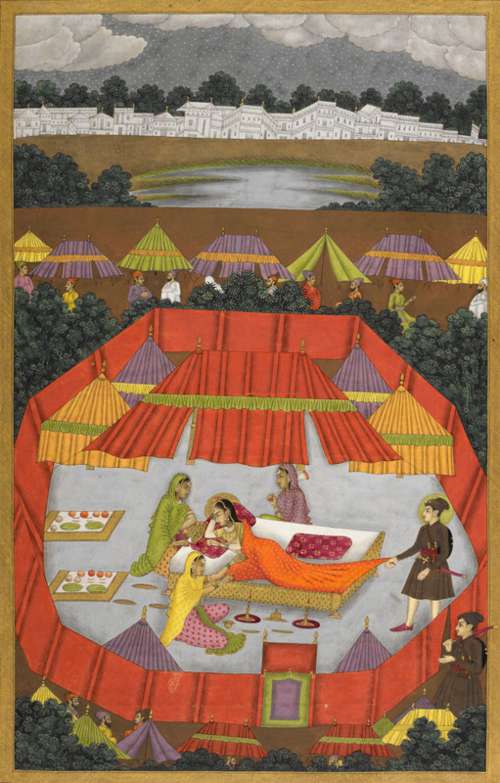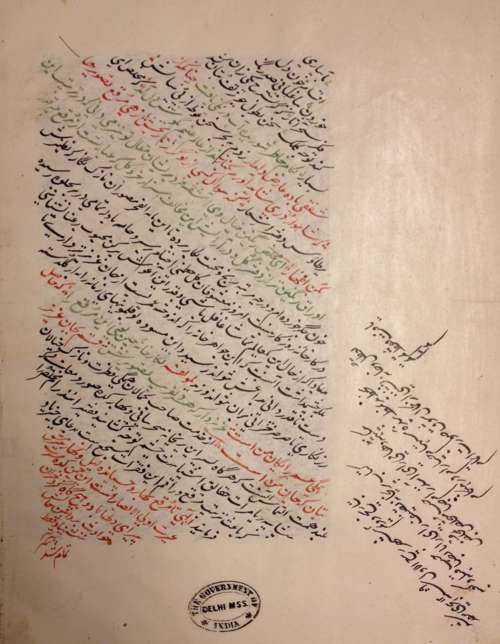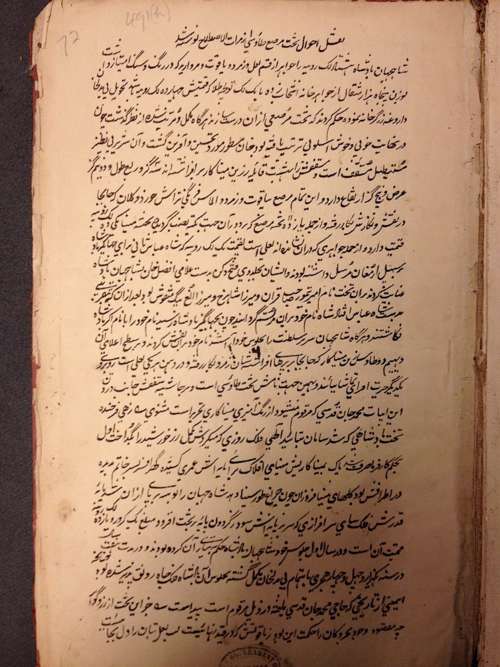
Portrait of the Mughal Emperor Muḥammad Shāh and the author's patron, the minister Iʻtimād al-Dawlah Qamar al-Dīn Khān. Taken from Mukhliṣʼs presentation copy of his Kārnāmah-i ‘ishq ʻBook of Affairs of Loveʼ. Artist: Govardhan II, c.1735 (British Library Johnson Album 38, f. 7v).
Despite the increasing political difficulties of the Mughal crown over the course of the 18th century and the hardships endured by Delhi’s inhabitants during successive invasions and waves of unrest, the Indo-Persian literary culture in which Mukhliṣ participated was thriving. There were lavish poetic gatherings (mushāʿirahs) and a person’s literary comportment, namely his mastery of both poetry and prose, was still considered indispensable for political life. Meanwhile, scholars were churning out dictionaries and critical tracts, and stretching the limits of Persian literature’s critical tradition, in some cases coming to strikingly modern conclusions about the nature of language and literary aesthetics.
The writing of history is obviously constrained by the sources available and in researching Indian history, it is often difficult to find the right material to be able to zero in on particular individuals and their thought. Most Persian texts written in India remain unpublished and are only accessible in manuscript. The British Library’s manuscript holdings are probably unparalleled in the world for being able to provide information about Mukhliṣ and his contemporaries. Most excitingly, the Delhi Persian collection is full of mid-18th century Indo-Persian critical and educational texts. (Though the collection has always been available for consultation, it is only with the digitisation a few months ago of the notes for a never-published catalogue that many scholars knew of its holdings.)
Many of many talents
Mukhliṣ was a prolific and varied writer. He was both a practicing poet and a professional bureaucrat, which at this time required mastery over a range of elegant prose composition styles including letter-writing. He was also a memoirist and wrote about his travels (see Alam and Subrahmanyam 1996).

Beginning of Aḥvāl-i sīzdah rūzah-i safar-i Garh Muktīsar, a diary, copied by the author, Ānand Rām Mukhliṣ, of his journey to the annual fair at Garmukhteshwar in 1747 and back (British Library IO Islamic 1612, ff.1v-2r).
As a scholar of literature, calligraphy, and painting he wrote works such as the dictionary Mirʾāt al-iṣt̤ilāḥ. At least one of his works, the Kārnāmah-yi ʿIshq ("Book of Affairs of Love") was lavishly illustrated, as explored in a previous blog post by Malini Roy. In writing about his life, scholars have unfortunately not been as prolific as Mukhliṣ himself was. The only monograph on Mukhliṣ – in any language as far as I know – is the published version of a Delhi University PhD thesis from decades ago (James 2011).

From Kārnāmah-i ‘ishq, the love-story of Prince Gauhar and Princess Malikah-i Zamani composed in 1731. In this scene Prince Gauhar removes the coverlet from the sleeping princess as proof of his presence in her tent. Artist: Govardhan II, c.1735 (British Library Johnson Album 38, f. 81v).
Mukhliṣ’s house was a meeting place for the great writers of the day. He received his established literary friends as well as poets whom he supported as they tried to make a name for themselves in Delhi. One of his close friends, Ṭek Chand Bahār, not only had a similar career path in the Mughal bureaucracy, but like Mukhliṣ wrote a dictionary, the mammoth Bahār-i ʿajam (see a previous post by Muhammad Isa Waley).
Both Mukhliṣ and Bahār were friends and students of Sirāj al-Dīn ʿAlī Khān, known as Ārzū, a poet who might be the greatest philologist (a literary critic and linguist) in the pre-modern Persian tradition (see Dudney 2013). Although Mukhliṣ considered Ārzū one of his teachers and Ārzū was about a decade older than Mukhliṣ, it was Mukhliṣ who facilitated Ārzū’s entrée into Delhi’s elite cultural scene when Ārzū first settled in the city.

The final page and colophon of Mukhliṣʼs Parī khānah ʻFairy Houseʼ, a florid essay on the composition of ornate prose, composed in AH 1144 (1731/32). Copied by Jiyā Rām and dated 2 Rabīʻ I 1259 (2 April 1843) (British Library Delhi Persian 491, f. 11v).

Extract from Mukhliṣ's dictionary, Mirʾāt al-iṣṭilāḥ, relating to the Peacock Throne (British Library Delhi Persian 491, f.72r).
Every poet had a network of loyalties to his teachers, students, and contemporaries. Mukhliṣ appears to have been associated with a wide network of Hindu Persian writers, as a rare miscellany in the British Library (Delhi Persian 491: for details, see below) suggests by presenting his works alongside those of contemporary Hindu writers.
Blending traditions
Contrary to the received wisdom that a failing political order produces a failed literary tradition, I see the 18th century as a time of great innovation in Indo-Persian poetry. Poets were debating the role of tradition as never before and literary criticism was incredibly vibrant. Urdu’s development as a literary language was part of this innovation.
At this time, the literary tradition that would come to be known as Urdu was part of Indian Persianate culture, not an alternative to it. Mukhliṣ lived in the time when the Persian-using and Urdu-using community of Delhi were one and the same – this fact tends to get lost in later accounts that want to emphasise the break between Persian and Urdu. And while he has no surviving Urdu compositions to his name, there is no sense that he is holding himself apart from Indian culture by being an expert in Persian.
Mukhliṣ is relevant in our time because he confounds expectations about India’s past. Some today seek to define Indian culture as static, monolithic, and synonymous with the modern understanding of Hinduism. However, the existence of historical figures like Mukhliṣ is at odds with the worldview of such revisionists. He was perfectly at ease with Persian, even using Islamic devotional formulae in his writing, while being in the eyes of those around him and in his own mind unproblematically a devout Hindu, whatever that meant at the time.
This article first appeared on the British Library's Asian and African Studies blog.
Buy an annual Scroll Membership to support independent journalism and get special benefits.

Our journalism is for everyone. But you can get special privileges by buying an annual Scroll Membership. Sign up today!
